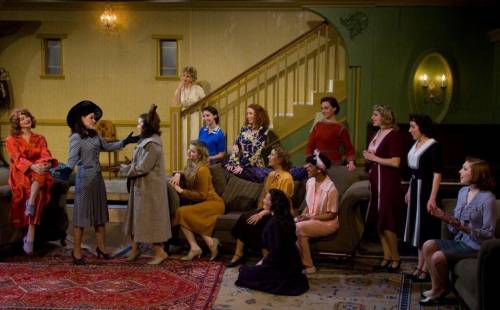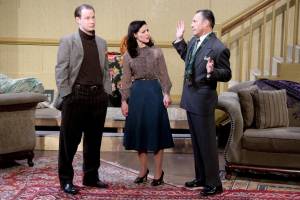
Edna Ferber and George S. Kaufman’s 1936 comedy Stage Door is the kind of play that inspires the proverbial, “They don’t write ’em like that anymore.” Three acts. Twenty-seven characters. Witty dialog. Snappy repartee. Not only do they not “write ’em” like that. In these tough economic times, no mid-to-large-size theater could afford toproduce’em like that either. (Just imagine the cost of salaries and costumes!)
The unique-to-L.A. 99-seat plan makes our talent-packed city probably the only one in the nation capable of staging a professional production of Stage Door in 2010, and no theater company is more up to the task than Open Fist. Their superb 2007 production of Michael Franco’s The Room proved the troupe’s aptitude for 1930s-style drama and 2008’s sensational revival of Light Up The Sky showed what a perfect fit the company’s actors make with “the world of the theatah” as seen through the eyes of Moss Hart (like Ferber a frequent Kaufman collaborator).
Thus, it should come as no surprise that Stage Door and Open Fist are a match made in Broadway (or should that be Hollywood?) heaven.
About half of the comedy’s two-dozen plus characters are aspiring actresses come from near and far to make New York City their home—and to make the theater their life. There’s idealistic Terry Randall (Amanda Weier), who’d never think of trading her dream of Broadway stardom for a Hollywood contract; blonde stunner Jean Maitland (Kim Swennen), who would (and does) head off to La La Land; the tragic Kaye Hamilton (Rebecca Rosenak Phelps), who has fled from an abusive husband only to find Broadway every bit as cruel; wise-cracking Judith Canfield (Stephanie Erb), a tough cookie with a tender filling; Linda Shaw (Pilar Alvarez), whose early morning return in evening gown and diamonds tells her mother (Beth Robbins) just what kind of girl her daughter has become; Louise Mitchell (Katy Tyszkiewicz), who exchanges her failed Broadway dreams for a wedding ring; and Olga Brandt (Mallory Bishop), a frumpy, grumpy Eastern European piano student (and the only resident not planning a career as an actress).
Completing the cast of principals are Judith Scarpone as Mrs. Orcutt, the Broadway has-been who serves as “den mother” to the young women who stay at her Fireside Club; Matt Roe as would-be playwright Keith Burgess, who sells out to Hollywood; and Arthur Hanket as movie producer David Kingsley, who nurses a love for the legitimate stage. The latter two vie for Terry’s affections.
Like Kaufman and Ferber’s The Royal Family, Stage Door is a love letter to the theater—and in this case also a poison pen missive to Hollywood. (No wonder their script was largely rewritten when filmed in 1937 with Katharine Hepburn as Terry.) It’s also filled with highly quotable bons mots, many with Tinseltown as their target. Keith is said to have “started up on a soapbox and ended up in a swimming pool.” Hollywood is referred to as a place where “all important things are decided in twenty minutes and the trivial ones take years.” About movies and the so-called actors who perform in them: “You put it in a tin can like Campbell’s Soup. You don’t even have to be alive to be in a picture!” Then there’s Terry’s comment about performing for the camera, “That isn’t acting. That’s piecework.” A line which gets a big laugh in 2010 is David’s “Theatergoers won’t come to see movie stars in plays just because they’re movie stars.” (Times have indeed changed in the past 75 years!)
Then again, perhaps not all that much. Stage Door’s mid-Great Depression setting is particularly relevant in this time of recession, the just-announced closing of the Pasadena Playhouse the gravest example of the financial crisis our theaters find themselves in. Theaters which can afford to offer Equity contracts have replaced big cast productions with solo shows and one, two, and three-handers. Web series offer aspiring actors yet another opportunity to hone their craft—for peanuts. And still they keep on coming, to New York, to Chicago, and to Los Angeles/Hollywood, hoping for that same big break that Terry, Jean, and the others have their sights on.
The twenty-five mostly young thespians appearing in Stage Door almost certainly have similar goals, and if their performances here are any indication, many have successful careers ahead. Certainly all have done their homework for this production. Actors in 1936 who wished to portray 1860s characters had only their imagination to rely on. Today’s performers have only to switch on their DVD player to study the way 1930s actors walked, talked, gestured, and moved, and the cast of Stage Door has obviously completed this assignment, capturing the heightened style that was the hallmark of an era.
Under Barbara Schofield’s assured and visually-varied direction, Stage Door features numerous memorable performances. Weier’s work in The Room and Light Up The Sky make her the perfect choice for Terry, and she is excellent, her performance revealing all of Terry’s idealism, intelligence, dedication, and spunk. Other standouts include a radiant Swennen, a delightfully dotty Scarpione, and gifted pianist Bishop. Michelle Lema and Laetitia Leon are a double hoot as a pair of matching-outfitted patooties known as Big Mary and Little Mary. A touching performance reveals Phelps to be an actress with talent and a particular affinity for the 30s, and Erb pays loving (and hilarious) tribute to those sardonic female sidekicks that made stars of Eve Arden and Vivian Vance.
Among the men, Roe and Hanket have the biggest roles and make the strongest impressions. The dynamic Roe’s native British accent is a sexy plus for the idealist-turned-hack he plays. (The role was apparently based on Clifford Odets.) Hanket is terrific as the sophisticated but down-to-earth Kingsley, and he has the kind of chemistry with Weier that makes us root for them as a couple from the get-go.
Completing the fine cast are Jordana Berliner, Tara Bopp, John Dimitri, Dustin Eastman, Kiley Eberhardt, Daphne Gabrielle, Bill Jackson, Conor Lane, T.J. Marchbank, Kevin McCorkle, Hannah Pierce, and Teresa Willis.
Only a colorblind casting misstep seems out of place in the play’s otherwise realistic 1930s setting, particularly since Bobby, the character in question, is supposed to be a Southern Belle with a Texan (!) boyfriend who fingers “Ol’ Man River” (!) on Olga’s piano. When Bobby commented on Terry’s “slaving till six, and after” at her job, I couldn’t help but cringe.
James Spencer’s sensational set makes full use of Open Fist’s expansive stage area, giving us the street entrance to the Footlight Club (we first see residents as they scurry down the street towards the front door), the large sitting room area, and an alcove leading to the dining area. Kudos to prop supervisors Ina Russell and Bruce Dickinson for their set decoration, including the great 1930s photos and Broadway posters adorning the walls (and the Open Fist lobby). Shon LeBlanc gets high marks for his period costumes and hats (oh those hats!), with only some too short skirts and too thin heels lowering his grade from A+ to A. Dan Reed’s excellent lighting reflects the various times of day and night of the play’s six scenes. Peter Carlstedt’s sound design is equally fine—1930s tunes on the Victrola, pouring rain, traffic noises, the cheers of movie star Jean’s adoring fans, and more.
With over 75 productions opening in January alone, I almost missed Stage Door. Thank goodness I didn’t. I would have hated not to have seen this rarely staged 1930s gem, presented here in all its big-cast, big-stage splendor. Oh, and there’s a party in the lobby after every performance, one more reason to catch Stage Door, the perfect antidote to all the small-cast, small-stage productions that abound as we enter this new decade. No offense to reduced-cast, reduced-budget theater, but in this case, bigger is quite special indeed.
Open Fist Theatre, 6209 Santa Monica Blvd., Hollywood.
www.openfist.org
–Steven Stanley
January 30, 2010
Photos: Kelsey Edwards




 Since 2007, Steven Stanley's StageSceneLA.com has spotlighted the best in Southern California theater via reviews, interviews, and its annual StageSceneLA Scenies.
Since 2007, Steven Stanley's StageSceneLA.com has spotlighted the best in Southern California theater via reviews, interviews, and its annual StageSceneLA Scenies.







 COPYRIGHT 2025 STEVEN STANLEY :: DESIGN BY
COPYRIGHT 2025 STEVEN STANLEY :: DESIGN BY